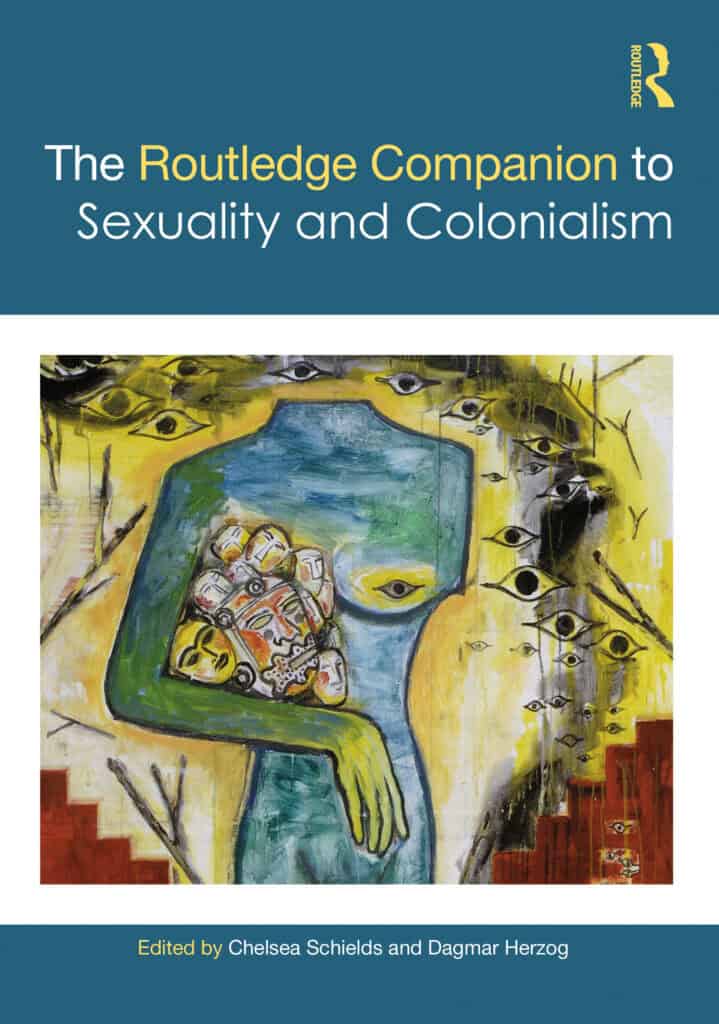Chelsea Schields
Nearly thirty years ago, anthropologist Ann Laura Stoler wrote that no topic appeared more frequently in archives of colonialism than that of sexuality. Why were discussions of the intimate so prominent within colonial archives? And how, exactly, did sex matter to the growth and consolidation of imperial regimes? These questions have energized scholars working across multiple fields to uncover how colonial authorities discussed and regulated sex, spurring a now voluminous body of scholarship. Three decades of intellectual production have driven home the point that intimacy was a site of regulation at once as important as and inseparable from those more traditional domains of power: the economy, high politics, and the law. The profits of empires increased, for example, when in the eighteenth and early nineteenth centuries European colonists outsourced the reproductive care of European soldiers to unwaged Indigenous women. Sexual and domestic arrangements always factored into the administration and economic balance sheets of empires, as did anxieties about the fragile cohesion of racial classifications when imperial actors traversed the color line.

Published in May 2021, The Routledge Companion to Sexuality and Colonialism is at once an intervention into this rich literature and a reflection on the field’s development. With thirty-one contributions spanning colonized contexts across the world, the volume documents the interventions into reproductive and sexual lives that upheld colonial projects. These interventions were not stable and they varied across time and place, but what these chapters definitively show is the impossibility of understanding colonial power without attention to the intimate. At the same time, the volume’s contributors also chart how a critical mass of scholars came to take seriously the study of sexuality and its regulation.
Co-editor Dagmar Herzog and I felt that the field was ripe for a global and interdisciplinary volume of this scope and size, not least because so much in our world has changed since the profound observation Stoler made nearly three decades ago. In the 1980s and 1990s, it was an urgent political and intellectual project to highlight the mutual constitution of gender, race, sexuality, and class. Indeed, this project remains important, even as many acknowledge the interdependency of these categories today. Pathbreaking scholarship proved time and again that racial categories, or the division between colonizer and colonized, was not a given. Divisions of race and status were created and re-created through laws and conventions about “who could do what with whom.” Regulating sex and reproduction in the colonies not only attempted to keep separate certain groups and their kin; it also created and maintained distinctions of race and class. When colonial elites described themselves or others as being “decent” and “respectable,” behind these designations were assumptions about sexual propriety and gender conduct that were themselves saturated by class values and racial logic. Many hoped and continue to hope that calling attention to the fragility and socially-constructed nature of these categories would destabilize their lingering political, economic, and social effects.
But scholars now are grappling with new issues: not just about the durability of racism, but also concerning the potentially creative difference of the past. These scholars are discovering how colonized subjects imagined and experienced their intimate selves in ways that were distinct from and perhaps even imperceptible to colonial authorities. Understanding these forms of selfhood, they argue, might newly invigorate struggles and survival today. Resurgent social movements, from the Movement for Black Lives to the mobilizations of Indigenous communities across the Americas, have underscored the need to consider histories not just of “races-making” but also of alternate conceptions of self, sex, and society. Importantly, the very notion that race cannot be understood in isolation from gender, sex, and class is itself a product of activist knowledge rooted in struggle.
Our ambition in this volume was to provide global coverage, not least in an effort to decenter Western empires and their intellectual inheritance. The volume thus spans many parts of the former colonial world, documenting different empires throughout time: from the Spanish Americas in the sixteenth century to the Ottoman and Japanese empires in the twentieth century and even enduring settler colonial relations today.
We also wanted to draw together bodies of scholarship that are not always in conversation – to learn from different approaches to sexuality and empire emanating from Indigenous Studies and Black Studies (and from a growing number of scholars working at the intersection of these fields), as from literary criticism and history. In this respect, we gained important comparative insights about distinct colonial projects and the role of sexual and reproductive regulation to each. In the context of settler colonialism, as historian Gregory Smithers and sociologist Laura C.L. Landertinger argue, one consequence of reproductive control in places like the United States, Canada, or Australia was to break the ties of Indigenous people to the land; to eliminate Indigenous claims to territory and to eradicate alternative relations between land and people that differed from settler notions of private ownership of and dominion over nature. To sever these ties to land, kin, and community, settlers violently displaced Indigenous people and removed Indigenous children from their families – a topic that has reemerged in public discussion with the discovery in October 2021 by the Tk’emlups te Secwepemc First Nation of a mass grave of Indigenous children near the Kamloops Indian Residential School in Canada. In the context of racial slavery in the Americas, as Françoise Vergès shows, white enslavers relied upon enslaved women of African descent not only to work but also to perform reproductive labor. Reproductive control was thus at the heart of racial slavery. Just as important are the relational insights that reveal how one empire might adapt lessons from another, as Aiko Takeuchi-Demirci shows of the movement of Western eugenic knowledge to Japan in the nineteenth and twentieth centuries.
The volume’s multidisciplinary approach is also an extraordinary benefit to the field, and our hope is that students and scholars across multiple disciplines might learn from the methodological innovations of the volume’s many contributors. Literary scholar Santanu Das’ entry on Indian troops on the Western Front of World War I, for instance, recreates the life worlds of Indian soldiers using novels, photographs, and paintings of their wartime experiences. In so doing, Das resurrects forms of intimacy including deep male friendships and bodily touch and closeness that were not strictly about sex. These kinds of sensations and relations would not have been detectable in the written record. At the same time, the volume includes a number of entries that work with “traditional” archives but that use really clever methods for doing so. Historian Brianna Leavitt-Alcántara’s essay works with the wills of mixed-race women in seventeenth-century Guatemala. At first blush, these sources may seem to say little about intimate selfhood. But Leavitt-Alcántara reads these documents as expressions of self-making, wherein non-elite, unmarried women claimed personas of Catholic piety and morality that were often denied them in wider society.
The result is an exceedingly rich volume that joins these unique, primary source-driven case studies with historiographical overviews of the field’s development. Grouped by world regions and themes (like settler colonialism), the volume also features useful historiographical essays that chart how scholars came to the study of sexuality, empire, and the debates that arose along the way. These essays are truly ideal for graduate students and advanced undergraduates looking to gain orientation in the field, and they are written with these audiences in mind. Authors also offered poignant reflections on the sources available to scholars and the promises and limitations posed by each. Nicole von Germeten pointed out the supreme irony that Iberian colonists in the Americas preserved the very practices they attempted to eradicate by recording vibrant and often fantastical renderings of erotic fantasies and sexual and reproductive practices; just as Kate Imy underscored how colonial authorities and archival practices powerfully defined what counted as “sex” or “illicit behavior” itself (a theme that reverberates throughout the volume’s case studies, too).
After thirty years of intellectual production, scholarly interest in the intimate lives of empire has not diminished. The continued “haunting” of our present by colonial histories of racial oppression, sexual control and violence, and economic exploitation necessitate that we continue to reckon with these enduring legacies and practices. The Routledge Companion to Sexuality and Colonialism works to advance this important work while also illuminating the many and often surprising histories of sexuality and empire. For the volume dwells also on the possibilities for pleasure, self-making, kinship, and community that could sustain survival in often violent and hierarchical colonial contexts. This is not to valorize colonialism but rather to inspire new methods for overcoming the catastrophes that characterized the colonial past and the durable disparities it has engendered.
 Chelsea Schields is Assistant Professor of History at the University of California, Irvine. Her research focuses on the histories of sexuality, race, oil, and empire in the Caribbean and modern Europe with a special emphasis on the Netherlands and its former Caribbean colonies. Recent articles on these themes have appeared in Radical History Review, Gender & History, and Historical Reflections/Réflexions Historiques. Her first book, Offshore Attachments: Oil and Intimacy in the Caribbean (under contract with the University of California Press), traces how the development of a global energy regime transformed Caribbean societies into significant sites in the global supply chain of oil, remaking intimate selves and sensibilities in the process. With Dagmar Herzog, she is co-editor of The Routledge Companion to Sexuality and Colonialism (2021).
Chelsea Schields is Assistant Professor of History at the University of California, Irvine. Her research focuses on the histories of sexuality, race, oil, and empire in the Caribbean and modern Europe with a special emphasis on the Netherlands and its former Caribbean colonies. Recent articles on these themes have appeared in Radical History Review, Gender & History, and Historical Reflections/Réflexions Historiques. Her first book, Offshore Attachments: Oil and Intimacy in the Caribbean (under contract with the University of California Press), traces how the development of a global energy regime transformed Caribbean societies into significant sites in the global supply chain of oil, remaking intimate selves and sensibilities in the process. With Dagmar Herzog, she is co-editor of The Routledge Companion to Sexuality and Colonialism (2021).

NOTCHES: (re)marks on the history of sexuality is licensed under a Creative Commons Attribution-NonCommercial-NoDerivatives 4.0 International License.
Based on a work at www.notchesblog.com.
For permission to publish any NOTCHES post in whole or in part please contact the editors at NotchesBlog@gmail.com




